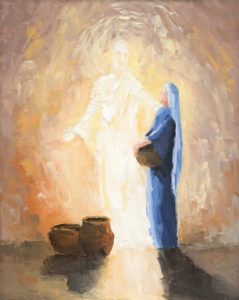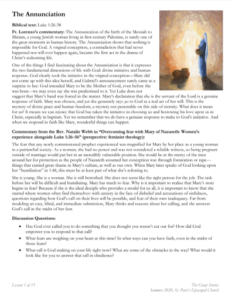The Annunciation

Biblical text: Luke 1:26-38
Fr. Lorenzo’s commentary: The Annunication of the birth of the Messiah to Miriam, a young Jewish woman living in first-century Palestine, is surely one of the great moments in human history. The Annunciation shows that nothing is impossible for God. A virginal conception, a contradiction that had never happened nor will ever happen again, became the first act in the drama of Christ’s redeeming life.
One of the things I find fascinating about the Annunciation is that it expresses the two fundamental dimensions of life with God: divine initiative and human response. God clearly took the initiative in the virginal conception—Mary did not come up with this idea herself, and Gabriel’s announcement surely came as a surprise to her. God intended Mary to be the Mother of God, even before she was born—we may even say she was predestined to it. Yet Luke does not suggest that Mary’s hand was forced in the matter. Mary’s declaration that she is the servant of the Lord is a genuine response of faith. Mary was chosen, and yet she genuinely says yes to God as a real act of her will. This is the mystery of divine grace and human freedom, a mystery not penetrable on this side of eternity. What does it mean for us? It means we can rejoice that God has taken the initiative in choosing us and bestowing his love upon us in Christ, especially in baptism. Yet we remember that we do have a genuine response to make to God’s initiative. And when we respond in faith like Mary, wonderful things can happen.
Commentary from the Rev. Natalie Webb in “Overcoming fear with Mary of Nazareth: Women’s experience alongside Luke 1:26–56” (perspective: feminist theology):
The fear that any newly commissioned prophet experienced was magnified for Mary by her place as a young woman in a patriarchal society. As a woman, she had no power and was not considered a reliable witness, so being pregnant outside of marriage would put her in an incredibly vulnerable position. She would be at the mercy of the men around her for protection as the people of Nazareth assumed her conception was through fornication or rape—things that carried great shame in Mary’s culture, as well as our own. When Mary later speaks of God looking upon her “humiliation” in 1:48, this must be at least part of what she’s referring to.
She is young. She is a woman. She is still betrothed. She does not seem like the right person for the job. The task before her will be difficult and humiliating. Mary has much to fear. Why is it important to realize that Mary’s story begins in fear? Because if she is the ideal disciple who provides a model for us all, it is important to know that she started where women often find themselves: with anxiety in the face of disbelief and accusations of sinfulness, questions regarding how God’s call on their lives will be possible, and fear of their own inadequacy. Far from modeling an easy, blind, and immediate submission, Mary thinks and reasons about her calling, and she answers God’s call in the midst of her fear.
Discussion Questions:
- Has God ever called you to do something that you thought you weren’t cut out for? How did God empower you to respond to that call?
- What fears are weighing on your heart at this time? In what ways can you have faith, even in the midst of those fears?
- What call is God making on your life right now? What are some of the obstacles in the way? What would it look like for you to answer that call in obedience?



Comments are closed.